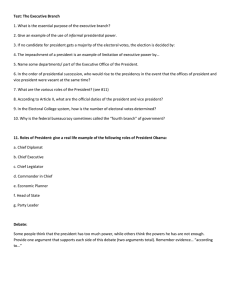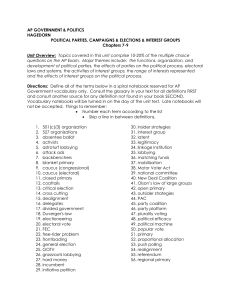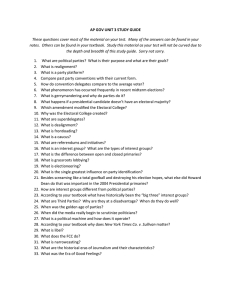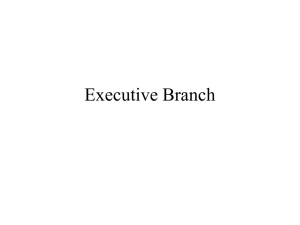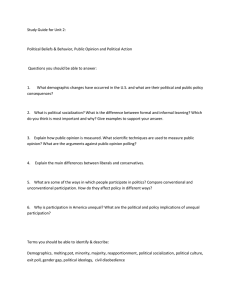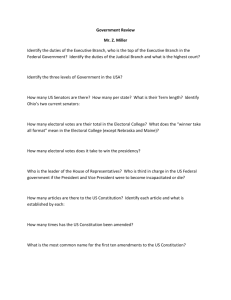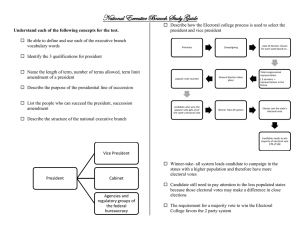Electoral Roll TAYLOR
advertisement
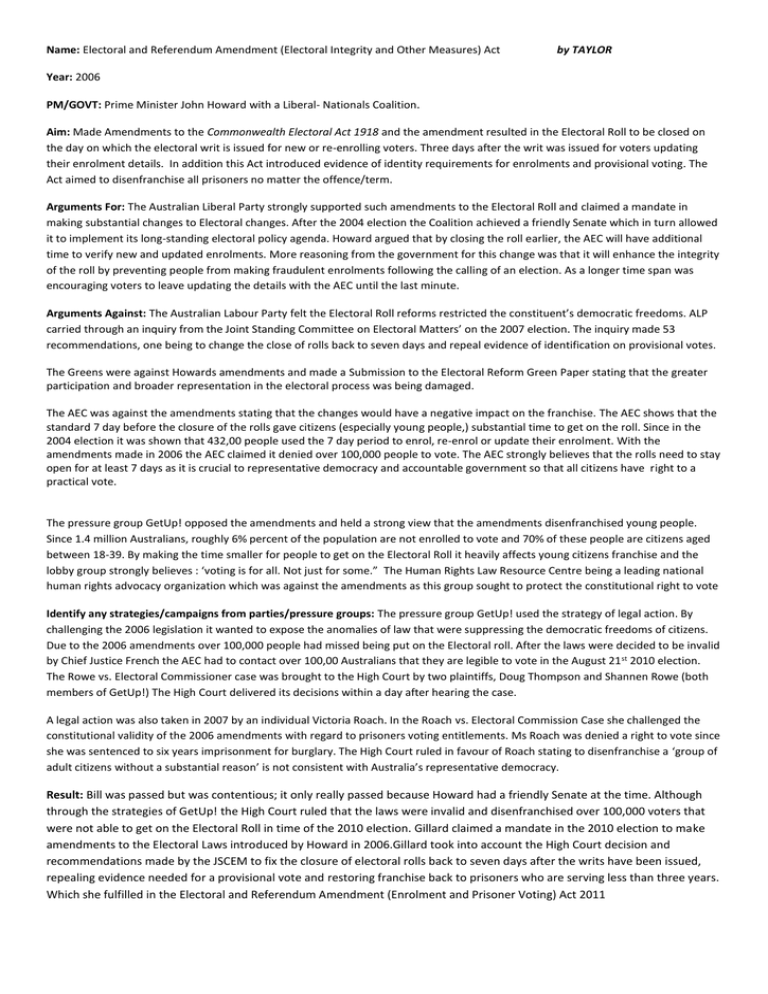
Name: Electoral and Referendum Amendment (Electoral Integrity and Other Measures) Act by TAYLOR Year: 2006 PM/GOVT: Prime Minister John Howard with a Liberal- Nationals Coalition. Aim: Made Amendments to the Commonwealth Electoral Act 1918 and the amendment resulted in the Electoral Roll to be closed on the day on which the electoral writ is issued for new or re-enrolling voters. Three days after the writ was issued for voters updating their enrolment details. In addition this Act introduced evidence of identity requirements for enrolments and provisional voting. The Act aimed to disenfranchise all prisoners no matter the offence/term. Arguments For: The Australian Liberal Party strongly supported such amendments to the Electoral Roll and claimed a mandate in making substantial changes to Electoral changes. After the 2004 election the Coalition achieved a friendly Senate which in turn allowed it to implement its long-standing electoral policy agenda. Howard argued that by closing the roll earlier, the AEC will have additional time to verify new and updated enrolments. More reasoning from the government for this change was that it will enhance the integrity of the roll by preventing people from making fraudulent enrolments following the calling of an election. As a longer time span was encouraging voters to leave updating the details with the AEC until the last minute. Arguments Against: The Australian Labour Party felt the Electoral Roll reforms restricted the constituent’s democratic freedoms. ALP carried through an inquiry from the Joint Standing Committee on Electoral Matters’ on the 2007 election. The inquiry made 53 recommendations, one being to change the close of rolls back to seven days and repeal evidence of identification on provisional votes. The Greens were against Howards amendments and made a Submission to the Electoral Reform Green Paper stating that the greater participation and broader representation in the electoral process was being damaged. The AEC was against the amendments stating that the changes would have a negative impact on the franchise. The AEC shows that the standard 7 day before the closure of the rolls gave citizens (especially young people,) substantial time to get on the roll. Since in the 2004 election it was shown that 432,00 people used the 7 day period to enrol, re-enrol or update their enrolment. With the amendments made in 2006 the AEC claimed it denied over 100,000 people to vote. The AEC strongly believes that the rolls need to stay open for at least 7 days as it is crucial to representative democracy and accountable government so that all citizens have right to a practical vote. The pressure group GetUp! opposed the amendments and held a strong view that the amendments disenfranchised young people. Since 1.4 million Australians, roughly 6% percent of the population are not enrolled to vote and 70% of these people are citizens aged between 18-39. By making the time smaller for people to get on the Electoral Roll it heavily affects young citizens franchise and the lobby group strongly believes : ‘voting is for all. Not just for some.” The Human Rights Law Resource Centre being a leading national human rights advocacy organization which was against the amendments as this group sought to protect the constitutional right to vote Identify any strategies/campaigns from parties/pressure groups: The pressure group GetUp! used the strategy of legal action. By challenging the 2006 legislation it wanted to expose the anomalies of law that were suppressing the democratic freedoms of citizens. Due to the 2006 amendments over 100,000 people had missed being put on the Electoral roll. After the laws were decided to be invalid by Chief Justice French the AEC had to contact over 100,00 Australians that they are legible to vote in the August 21 st 2010 election. The Rowe vs. Electoral Commissioner case was brought to the High Court by two plaintiffs, Doug Thompson and Shannen Rowe (both members of GetUp!) The High Court delivered its decisions within a day after hearing the case. A legal action was also taken in 2007 by an individual Victoria Roach. In the Roach vs. Electoral Commission Case she challenged the constitutional validity of the 2006 amendments with regard to prisoners voting entitlements. Ms Roach was denied a right to vote since she was sentenced to six years imprisonment for burglary. The High Court ruled in favour of Roach stating to disenfranchise a ‘group of adult citizens without a substantial reason’ is not consistent with Australia’s representative democracy. Result: Bill was passed but was contentious; it only really passed because Howard had a friendly Senate at the time. Although through the strategies of GetUp! the High Court ruled that the laws were invalid and disenfranchised over 100,000 voters that were not able to get on the Electoral Roll in time of the 2010 election. Gillard claimed a mandate in the 2010 election to make amendments to the Electoral Laws introduced by Howard in 2006.Gillard took into account the High Court decision and recommendations made by the JSCEM to fix the closure of electoral rolls back to seven days after the writs have been issued, repealing evidence needed for a provisional vote and restoring franchise back to prisoners who are serving less than three years. Which she fulfilled in the Electoral and Referendum Amendment (Enrolment and Prisoner Voting) Act 2011
